Inside Abuja community where residents share contaminated water with cattle, without access to healthcare
By Yakubu Mohammed
For decades, residents of Saimami Ubo, a suburb of Rubochi ward in Kuje Area Council, Abuja, solely depend on disjointed, contaminated streams, infiltrated by herds of cattle pasturing through the community. Sadly, they find it difficult to access healthcare too.
Patient Amos, a resident of the village had buried two of her children behind her house. They died when she went into labour and had no means to be taken to the hospital.
In 2008, Patience lost her female child following a protracted labour that gripped her in the middle of the night. The 46-year-old woman had a similar experience three years later.
Patience used a stone to mark the point where her second child was buried.

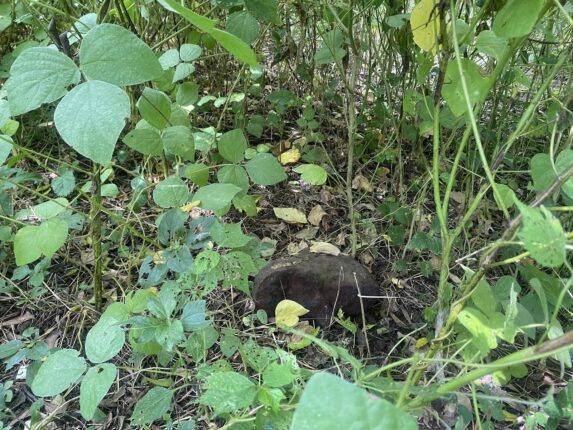
Patience used a stone to mark the point where her second child was buried.
“In 2008 and 2011, I went into labour in the night and there was no motorcycle to take me to Rubochi,” Patience recalled. “By the time we got a motorcycle in the morning, I gave birth to lifeless babies. I buried them behind our compound here.”
Patient Amos
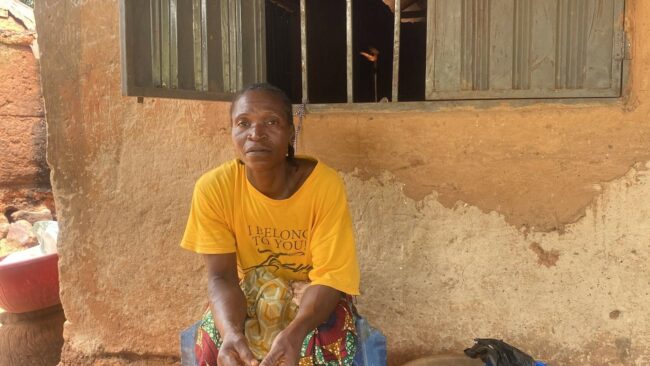
Patient Amos
Patience’s gory story opens a glimpse into how residents {in need of medical attention] of the water-strapped FCT community suffer untold hardship. Apart from pregnant women who helplessly battle between life and death [in labour], the community members also suffer waterborne diseases, especially cholera. This results from the filthy water they drink.
The struggle for water pitches herders and locals against each other
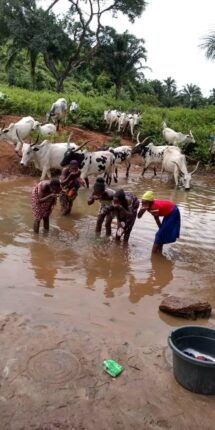
Residents sharing same pond with cattle
The unhealthy water has done more bad than good to the residents. “Somedays, we fight with herders,” Dauda Tumaka, an interim monarch in the community told SOLACEBASE.
Tumaka said the contaminated water is responsible for waterborne diseases ravaging the community. “And more disheartening, there is no single health center, except Rubochi General Hospital which is about 20 minutes drive from our village,” he growled.
“Before we got to the river, cows would have unsettled the water leaving us with no option but to wait for it to settle,” the monarch explained. As a result of this, “people have fallen sick several times and we have to take them to Abaji or Rubochi because we don’t have a hospital here.”
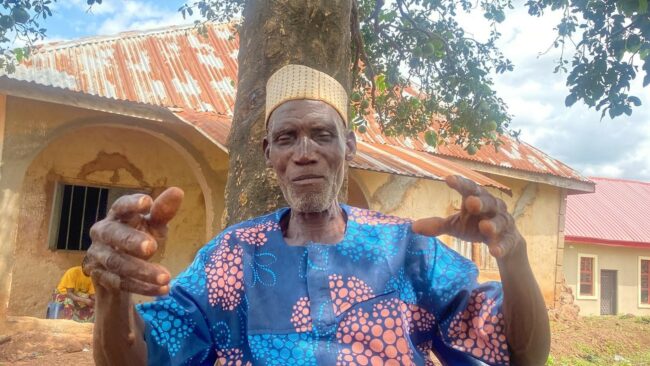
Dauda Tumaka, the interim monarch
Danjuma Madaki Dakwai, an elder in the village who took SOLACEBASE to the stream explained that the struggle for water between villagers and the herders almost became violent in 2021.
“There was a day when the herders trooped to the river with their cattle,” Dakwoi recalled. “They met our women there preparing to fetch water and the herders overpowered them, allowing their cattle to ruffle the water.”
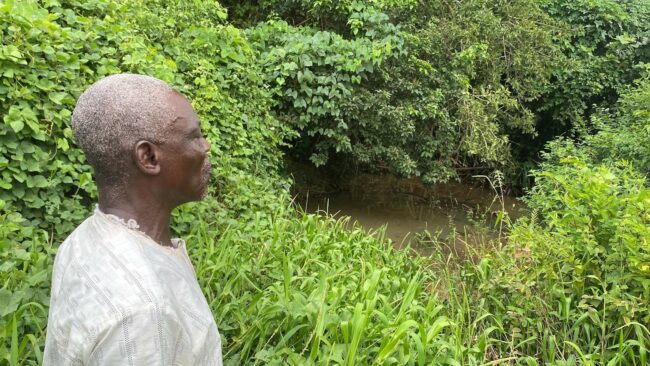
Danjuma Madaki Dakwai , an elder in the village
This, Dakwai revealed, erupted into a crisis which would later be settled at the late monarch’s palace, Dogara Dakwai.
Although he explained that the herders with whom his people fought had vacated the community, a new set who recently migrated to the area still polluted the water.
“Since we can’t fight them, we have urged our women to avoid them and allow them to do whatever they deem fit with the water,” he said.
“In the dry season, this place dries off and we move to another pond over there,” Dakoi told our reporter. “We clear it and fence it with stocks of guinea corn. Still, the herders would deface the fences to pave the way for their cattle.”
Residents battling Cholera
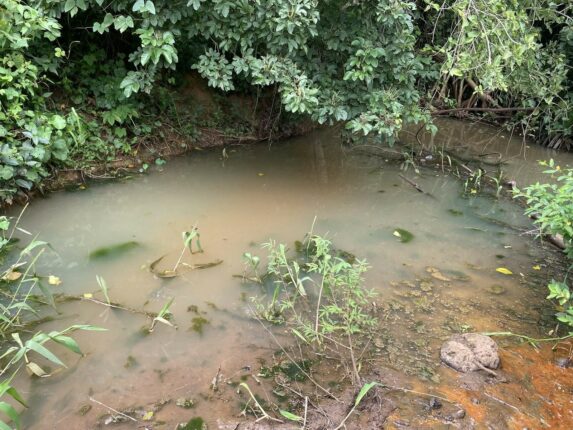
A section of the pond
Among the 111,062 suspected cases of cholera recorded in 2021, not more than 1,286 were domiciled in Abuja as 77 casualties were confirmed in the Federal Capital City.
Surprisingly, FCT recorded zero cases in the following year [between January to September] as 10,754 cases were confirmed across 31 states including Abia, Adamawa, and Bauchi among others.
Yet, residents of the Saimami Ubo still suffer from the scourge. Dogara Abila, a health worker in the community, told SOLACEBASE that cases of Cholera are still rampant.
Read Also: Investigation: Contractor denies getting N60m contract Refugee Commission purportedly awarded
“I am a health worker and I can tell you that we, especially our children, still suffer from the disease,” he said.
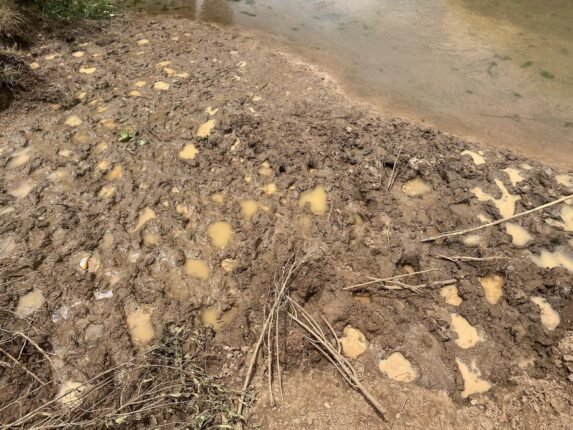
The data collected from the NCDC website noted that the disease [Cholera] was reported largely among children of the 5-14 age group.
Maryam Yahaya, a mother of four corroborated him, saying despite purifying the water with alum, her children would not stop falling sick.
“Water that is not good must cause some diseases,” Maryam, who had just returned from the forest where she went to fetch firewood, said. “Sometimes, my children complain of stomach pain. At times, they suffer skin diseases.”
Dr Ahmad Umar Pai, a medical doctor who was recently transferred to Rubochi General Hospital in Kuje explained why such water would keep exposing the villagers to health hazards.
“There is no way people using such kind of water would be spared from contracting such disease,” he said, adding that medical records of patients from the community “say it all.”
Although Eunice Shilo, the information officer at the hospital, refused to release the data Dr Pai was referring to, she said patients from the community mostly come with waterborne diseases including diarrhoea, malaria and cholera.
Digging wells — ‘A short-term solution’
At least 70 per cent of Nigerians still lack access to basic water services, according to a UNICEF report. It means that over 60 million Nigerians drink contaminated water, which has been linked to cholera and several other deadly diseases.
Disturbed by their only source of water, the villagers dug wells which only served them during rainy seasons.
“We have about three of these wells but they served us for a short period — the rainy seasons,” Dakwoi muttered. “During times like this, we have no option than returning to the streams.”
Tumaka, the interim monarch argues there won’t be a need to brawl with the herders over unsafe water if “the government provides us with a borehole.”
“I was born in this village and I am getting to 70 now,” he continued. “But I haven’t seen any development in this community. We have been using that water since time immemorial.”
Read Also: Meningitis Outbreak: Jigawa residents pay the price for govt’s healthcare failure
A concerned youth from the community, Dennis Dagzy, said he had written to the Kuje council chairman, Abdullahi Sulaiman Sabo but his efforts proved abortive.
“Apart from the letters, I requested to meet them but up till now, I have not been permitted,” he told SOLACEBASE. “My proposed visitation letter was denied.”
The Chairman, Sabo and the councillor representing Rubochi Ward, Sule Bitrus could not be reached immediately. Their contacts were not reachable and text messages sent to them had not been responded to as of press time.
Meanwhile, Austine Elemue, spokesman for Nyesom Wike, the Minister of FCT, argued that the “state” can not be doing everything while the councils watch. “We should ask ourselves what the local government is doing if the state — FCT — would be the one to construct roads, health centres or provide water and other things,” he told SOLACEBASE.
The spokesman emphasized that the councils are closer to the rural dwellers, adding they should own up to certain responsibilities.
When contacted, Karo Sani Bala, the Head of Media and Publicity at the FCT Rural Water Supply and Sanitation Agency (RUWASSA), said our findings had been shared with the agency’s directorate.
“The Directorate appreciates your zeal and efforts to report the less privileged and voiceless groups and communities in the FCT,” Bala wrote to SOLACEBASE, noting Saimami Ubo community grappling with water and sanitation crisis has been included in the “next projects for water, sanitation and hygiene.”
This SOLACEBASE publication is produced with support from the Wole Soyinka Centre for Investigative Journalism (WSCIJ) under the collaborative Media Engagement for Development, Inclusion, and Accountability Project (CMEDIA) funded by the MacArthur Foundation.

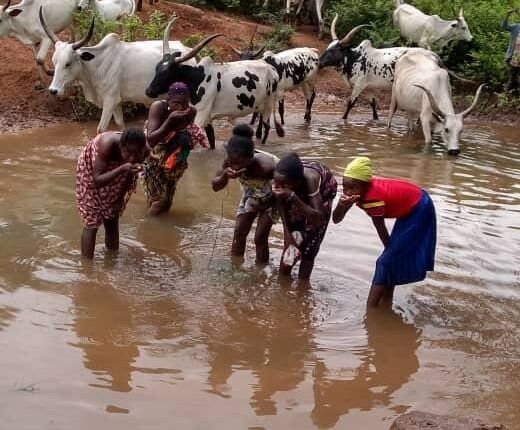

Comments are closed.